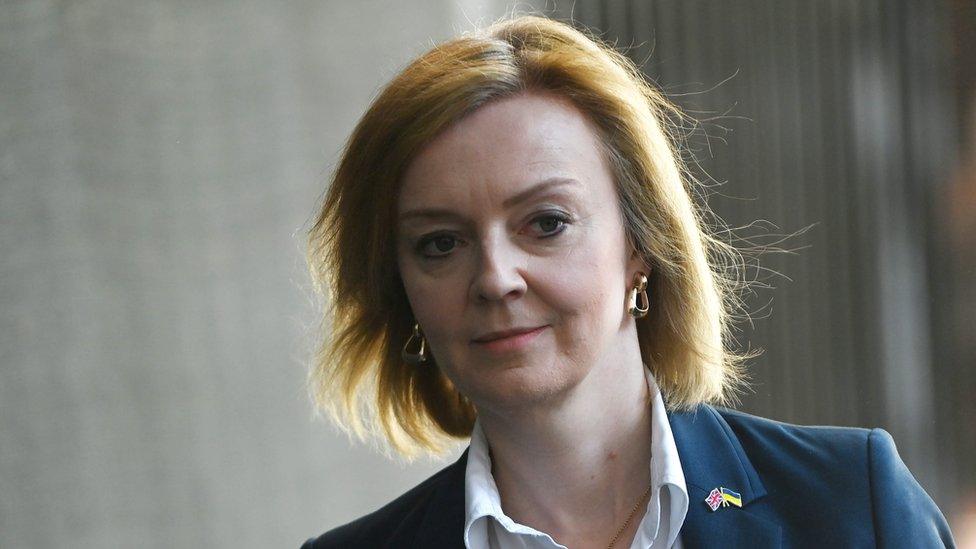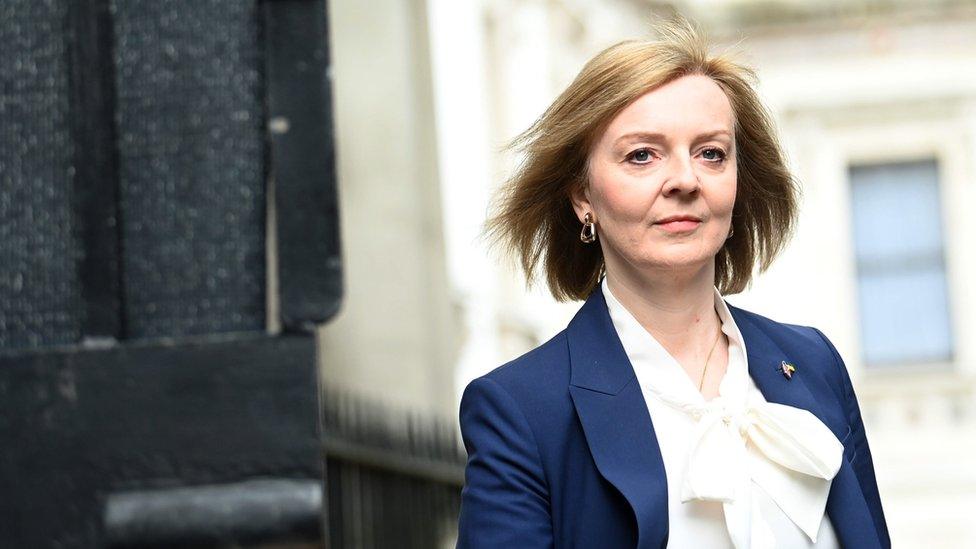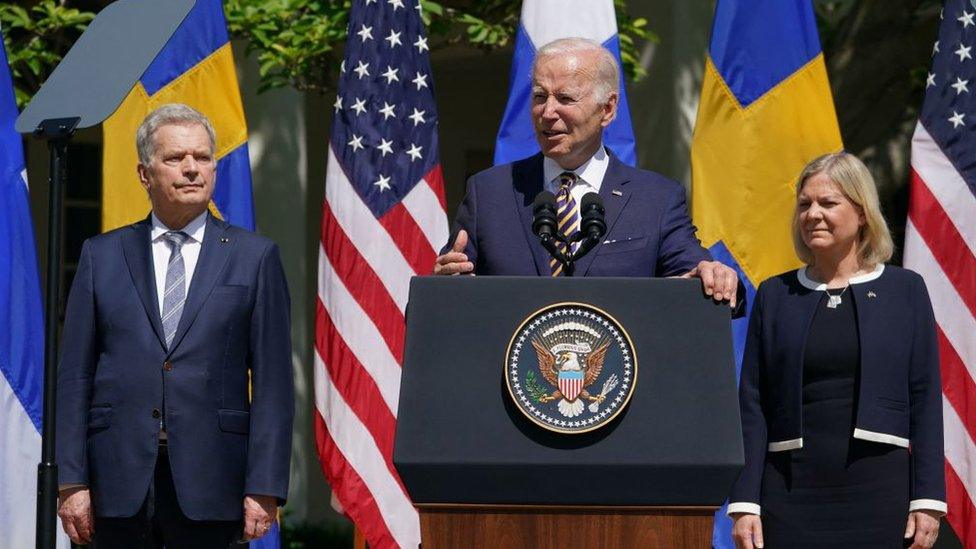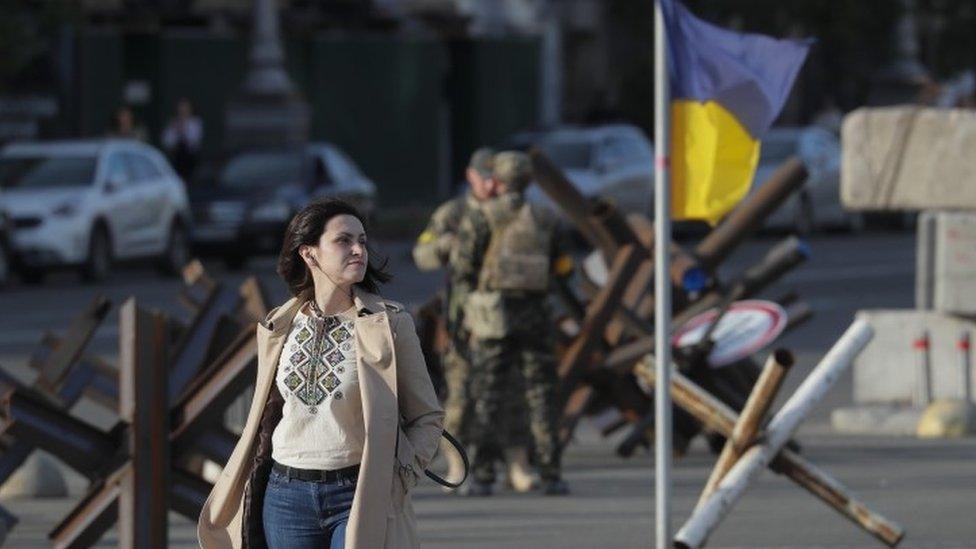Moldova should be equipped to Nato standard, says UK's Truss
- Published

Moldova should be "equipped to Nato standard" to help it guard against the threat of a Russian invasion, Foreign Secretary Liz Truss has said.
Ms Truss told the Telegraph that talks were under way with allies about how to help smaller nations defend themselves.
She said it was clear that, despite limited success in Ukraine, President Vladimir Putin retained "ambitions to create a greater Russia".
Moldova, once a Soviet republic, sits on Ukraine's south-western border.
It does not share a border with Russia, but is close to some of the regions currently occupied by Russian forces in Ukraine's south.
Moldova is not a member of Nato, although it did apply to join the European Union less than two weeks after the invasion of Ukraine.
Ms Truss said that discussions about upgrading Ukrainian defences to deter future aggression would also cover "other vulnerable states such as Moldova".
"I would want to see Moldova equipped to Nato standard," she said. "This is a discussion we're having with our allies."
Asked whether that was because Russia was thought to pose a security threat to Moldova, she said: "Absolutely. I mean, Putin has been clear about his ambitions to create a greater Russia.
"And just because his attempts to take Kyiv weren't successful, doesn't mean he's abandoned those ambitions."
Moldova, one of Europe's poorest countries, is home to many ethnic Ukrainians and has taken in more than 437,000 refugees from the war.
In a country of 2.6 million people that is higher than any other for the size of its population.
Moldova's President Maia Sandu is strongly pro-EU, but her predecessor Igor Dodon - who still has many supporters - was pro-Russian.
Russia supports separatists who control a breakaway region called Transnistria and has around 1,500 troops there.
In late April, the Transnistrian authorities said that explosions had targeted their state security HQ in the main city of Tiraspol, Soviet-era radio masts used to broadcast Russian news, and a military unit in a village outsider Tiraspol.
Separatist authorities blamed Ukrainian "infiltrators" but Kyiv said Russian special services were responsible.
Dr Jack Watling, senior research fellow at defence and security think tank the Royal United Services Institute, told BBC Radio 4's Today programme: "There isn't an immediate threat against Moldova from the Russian military but there is definitely a significant threat from Russian subversive activity and destabilisation actions."
He said it was "sensible" to build up "appropriate capabilities" so Moldova "can stand on its own two feet" given that Russia has publicly indicated that it has designs on that country.
"It is worth doing that while you have the time to do it properly rather than coming to the problem when the threat is very acute", he added.
Ms Truss' comments come just weeks after she said the West "must be prepared for the long haul and double down on our support" for Ukraine.

Speaking in London, she said: "If Putin succeeds there will be untold further misery across Europe and terrible consequences across the globe. We would never feel safe again."
She also called for an increase in the UK's defence spending and said that the Nato target of 2% of GDP should be a "floor, not a ceiling".
In April, Prime Minister Boris Johnson promised that the UK would provide Ukraine with more military equipment.
In a phone conversation with President Volodymyr Zelensky, he pledged that more armoured vehicles, drones and anti-tank weapons would be sent.
On Friday, the PM also held a call with Turkish President Recep Tayyip Erdoğan in which they discussed recent applications for Nato membership by Sweden and Finland.
Turkey has signalled an intention to veto the applications, accusing the countries of not taking a "clear stance" against Kurdish groups it considers to be terrorists.
A Downing Street spokesperson said Mr Johnson had told Mr Erdoğan that Finland and Sweden would be valuable additions to the Nato alliance, and had encouraged him to work with counterparts in both countries to address any concerns ahead of a summit of the military alliance in Madrid in June.
Related topics
- Published27 April 2022

- Published20 May 2022

- Published20 May 2022
